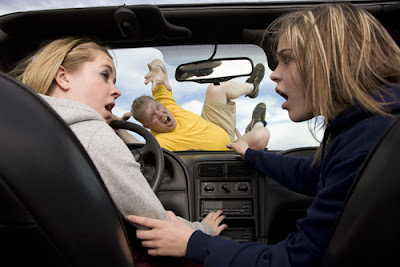Did you know that August is the most
dangerous month to drive in, and Saturday is the most dangerous day, according
to the National Highway Traffic Safety Administration? Not everyone considers
their car to be a deadly weapon—but they should. In 2010, 32,885 people
in the U.S. were killed in car crashes. As our constant need to be digitally
connected increases, the number of accidents and car-related deaths is likely
to shoot up as well.
Would you drive the equivalent of a
football field going over 55 mph—blindfolded? You probably answered, “Of course
not. That’d be crazy!” But, anyone who has ever sent a text while driving, has
actually done just that. This means, every time you get behind the wheel,
you’re sharing the road with a lot of people driving big machines, who aren’t
really paying attention. Whoa.
Most Dangerous for Young People
 According to an article by Instant Checkmate, vehicle accidents are the
leading cause of death for people between the ages of 15-20. This means that
cars cause more deaths for people of that age group than drugs, guns, or
violence. People within this demographic are more likely to engage in
“distracted driving” habits such as talking to other passengers in the car,
texting, or changing radio stations.
According to an article by Instant Checkmate, vehicle accidents are the
leading cause of death for people between the ages of 15-20. This means that
cars cause more deaths for people of that age group than drugs, guns, or
violence. People within this demographic are more likely to engage in
“distracted driving” habits such as talking to other passengers in the car,
texting, or changing radio stations.
Human error accounts for a staggering
majority of all car crashes—over 90%. According to Alert Driving magazine,
“There are 3,500 deaths a day or 150 every hour, and nearly three people get
killed on the road every minute.” The truth is, driving our cars is one of the
most dangerous activities we will participate in over the course of our
lifetimes, and we do it everyday.
What if Cars Drove Themselves?
Google has been putting major funding
towards research focused on developing a self-propelled car. The exciting part
is, cars that can drive themselves are not something that only exists in
science fiction books—the technology is closer to becoming a reality than you
might think.
In fact, in 2012, California stepped
ahead of the curve and legalized Google’s self-driving cars, as long as a human
passenger came along for the ride. Google's co-founder Sergey Brin said that he
hopes self-driving cars will be ready to hit the road in less than five years.
What’s more, the Institute of Electrical and Electronics Engineers (IEEE)
recently released predictions that autonomous cars will account for up to 75
percent of vehicles on the road by the year 2040. They also speculate that by
mid-century, people will no longer need to obtain a driver’s license. In safety
tests, the self-driving car has so far exceeded expectations.
Volvo's aim is that by 2020 no one will
ever be killed or seriously hurt driving its latest models. Cheers to that.















0 comments:
Post a Comment